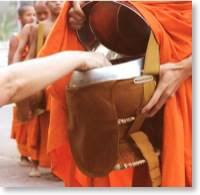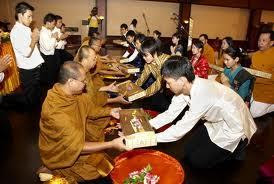Patti Dana (Sharing of Merit)

Sharing of benefits of your good deeds to others is known as patti dana (patti - what you had gained and dana - sharing your merit). A donor with no doubt enjoy the benefits of his dana. The desire to share with others the merits gained is indeed magnanimous. We all, ater doing a good deed, should proclaim, "all those who can hear me, come and share my merits. May you all gain as much benefits as I do," and share the benevolence gained. This is patti dana, which in itself is a separate good deed. Caution : Some donors just verbally say, "come and share my merits" but have no sincere wish to do so. Such perfunctory sharing does not qualify as patti dana. Once upon a time, a donor invited many people to his son's novitiation and gave lavish feast. The contributions (from invitees) did not cover the expenses of the feast, so he was left in debt. After the ceremony came the time to share merits. At that time, he was mentally calculating how much he would owe. Somebo...




